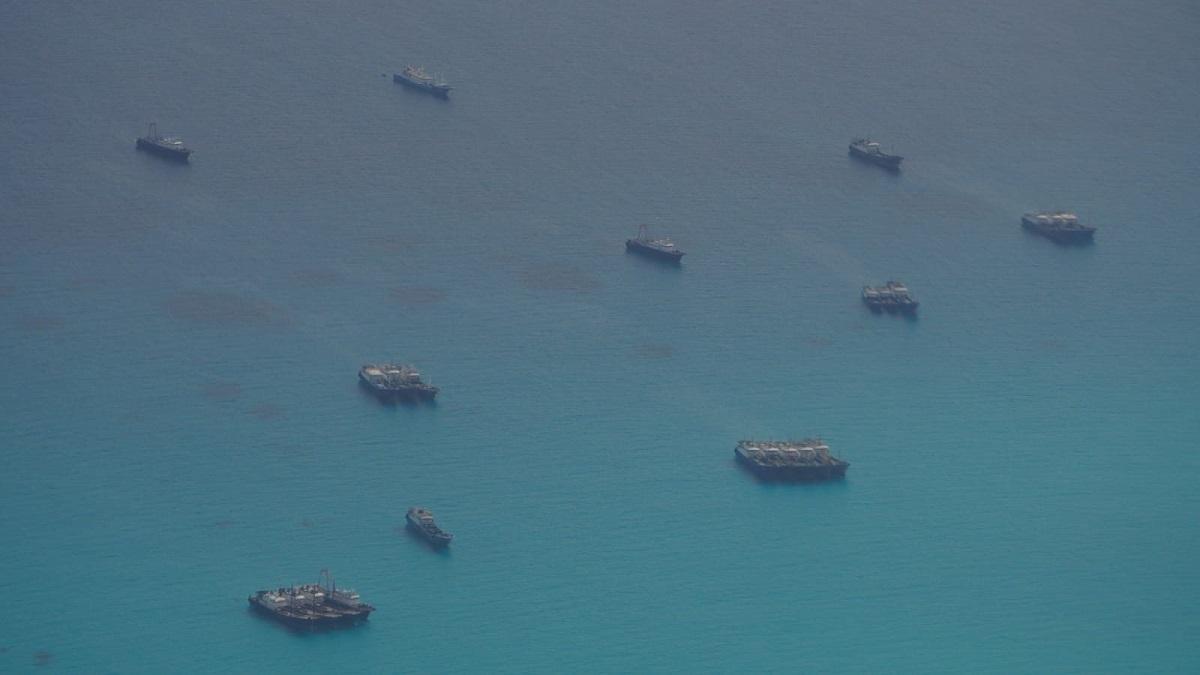PH military bares 'concerning resurgence' of Chinese swarming activity in WPS

There has been a "concerning resurgence" of swarming activity involving over two dozen Chinese fishing vessels in the West Philippine Sea (WPS), the Philippine military said Thursday.
Based on air patrols conducted on September 6 and 7, the Armed Forces of the Philippines' Western Command (Wescom) said 23 Chinese fishing vessels (CFVs) were observed in Rozul (Iroquios) Reef, making it the "most prominent location" of the alleged swarming activity.
Wescom said the presence of Chinese fishing vessels in Rozul Reef violates the Philippines' sovereign rights and jurisdiction since the reef is located within the country's Exclusive Economic Zone (EEZ) and continental shelf.
"Previous swarming incidents in the area have also been followed by reports of massive coral harvesting, further raising concerns about their harmful environmental impact," Wescom said.
In an August 24 report, the Philippine Navy said 33 Chinese fishing vessels were spotted in Rozul Reef during a routine air patrol, Wescom said.
Meanwhile, Wescom, which is in charge of Palawan and the Kalayaan Group of Islands, said additional swarming was spotted in Escoda (Sabina) Shoal with five Chinese fishing vessels, and in Baragatan (Nares) Bank with two Chinese fishing vessels.
Like Rozul Reef, Escoda Shoal is also located within the Philippine EEZ and serves as a marker for the approach to Ayungin Shoal, which is part of the Kalayaan Group of Islands.
"The increased presence of CFVs raises concerns regarding the potential implications for Philippines' maritime security, fisheries conservation, territorial integrity, and preservation of the marine environment," Wescom said in a statement on Facebook.
"These activities have been a source of tension in the WPS and have contributed to instability in the region," it added.
GMA News Online has reached out to the Chinese Embassy in Manila for its comment on the alleged swarming activity but it has yet to respond as of posting time.
Beijing claims sovereignty over almost the entire South China Sea, including the West Philippine Sea WPS as it ignores the July 2016 ruling by the UN Permanent Court of Arbitration in The Hague that invalidates its massive claims.
Amid the swarming activity, Wescom said Philippine security officials will "remain vigilant and take necessary measures to safeguard its vital national interests and maintain stability in the region."
The Philippine military last week announced it successfully conducted another replenishment mission to troops stationed at the grounded BRP Sierra Madre in Ayungin Shoal.
It was the third resupply mission after the August 5 incident when the China Coast Guard used water cannons against the Philippine fleet conducting a similar mission.
Another resupply mission was conducted and completed on August 22.
A Philippine ship, BRP Sierra Madre, has been grounded at the Ayungin Shoal in the West Philippine Sea since 1999. A dozen marines and sailors are aboard the ship, which has become a symbol of Philippine sovereignty in the offshore territory.
China, for its part, expressed “firm opposition” to the resupply mission, claiming that the Philippines illegally transported construction materials to the commissioned navy ship.
It also said that CCG vessels “strictly warned the Philippine vessels in accordance with the law, tracked and monitored the vessels all the way, and effectively regulated them.”
Sought for comment on the allleged swarming activity, a spokesperson for the Chinese Embassy in Manila said, "China has indisputable sovereignty over the Nansha Islands and their adjacent waters."
"China is an important force for maintaining peace and stability in the South China Sea. It abides by the purposes and principles of the Charter of the United Nations and is committed to upholding and promoting international rule of law," the embassy spokesperson said.
The spokesperson said China respected and acted "in accordance with international law."
"While firmly safeguarding its territorial sovereignty and maritime rights and interests, China adheres to the position of settling disputes through negotiation and consultation and managing differences through rules and mechanisms," the embassy said.
"China endeavors to achieve win-win outcomes through mutually beneficial cooperation, and is committed to making the South China Sea a sea of peace, cooperation and friendship," it added. —KBK/NB, GMA Integrated News




